新概念英语第26课讲义
新概念英语第三册 Lesson 26 Wanted_ a large biscuit tin课件
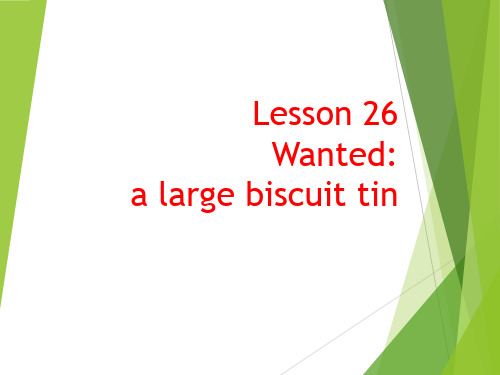
to one’s taste 合某人的口味, 称某人的心愿
e.g: He did what he wanted to do to his taste.
There is accounting for taste. 【谚】人各有所好。
He who has never tasted bitter knows not what is sweet.
advertisement n .[ədˈvə:tismənt] Br n. [ˌæ dvɚˈtaɪzmənt] Am
In their efforts to persuade us to buy this or that product, advertisers have made a close study of human nature and have classified all our little weaknesses.
e.g: Can you persuade her out of her foolish
plans?你能劝她放弃那些愚蠢的计划吗?
2、也可用persuade sb. into doing sth.结构,含 义与persuade sb. to do sth. 相同 e.g: My husband persuaded me to come. e.g: How can we persuade them into joining us?
exert oneself to do sth. 努力, 尽力, 出力 e.g: He never exert himself to study hard. exert every effect 尽一切努力
exertion n.尽力, 努力, 发挥 ;(能力、权力等的)行 使, 运用combine exertion and rest 劳逸结合
新概念英语第三册Lesson26课文音标版讲义

26No one can avoid being influenced by advertisements. nəʊ wʌn kæn əˈvɔɪd ˈbiːɪŋˈɪnflʊənst baɪədˈvɜːtɪs mənts.没有人能避免受广告的影响。
没有人能避免受广告的影响。
Much as we may pride ourselves on our good taste, we are no longer free to choose the things we want, mʌʧ æz wiː meɪ praɪd ˌaʊəˈselvz ɒn ˈaʊəɡʊd teɪst, wiːɑːnəʊˈlɒŋɡəfriːtuːʧuːzðəθɪŋz wiːwɒnt,尽管我们可以自夸自己的鉴赏力如何敏锐,但我们已经无法独立自主地选购自己所需的东西了。
尽管我们可以自夸自己的鉴赏力如何敏锐,但我们已经无法独立自主地选购自己所需的东西了。
for advertising exerts a subtle influence on us. fɔːrˈædvətaɪzɪŋɪɡˈzɜːtsəˈsʌtl ˈɪnflʊəns ɒn ʌs.这是因为广告在我们身上施加着一种潜移默化的影响。
这是因为广告在我们身上施加着一种潜移默化的影响。
In their efforts to persuade us to buy this or that product, ɪn ðeər ˈefəts tuː pəˈsweɪd ʌs tuː baɪ ðɪs ɔː ðæt ˈpr ɒdʌkt,做广告的人在力图劝说我们买下这种产品或那种产品之前,做广告的人在力图劝说我们买下这种产品或那种产品之前,advertisers have made a close study of human nature and have classified all our little weaknesses. ˈædvətaɪzəz hæv meɪd ə kləʊs ˈstʌdi ɒv ˈhjuːmən ˈneɪʧər ænd hæv ˈklæsɪfaɪd ɔːlˈaʊəˈlɪtl ˈwiːknɪsɪz.已经仔细地研究了人的本性,并把人的弱点进行了分类。
新概念英语第二册Lesson26课件
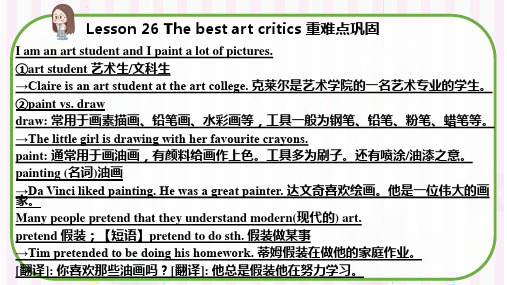
pattern图案/样式/式样/模式cal 批评的/评判性的; criticize (动)批评/批判/评论 critic 批评家/评论家
appreciate 感激/欣赏, 后接事 appreciate doing sth 感谢做了某事
for a moment 一会儿 upside down 颠倒(上边朝下); inside out 里朝外地
Lesson 26 The best art critics 重难点巩固
They always tell you what a picture is ‘about’.
①【回顾】tell的用法
②【分析】what a picture is ‘about’ 在句子的成分,及其特点。
Of course, many pictures are not ‘about’ anything.
notice (名)注意/布告/通知; (动)注意到 from the inside out 从里到外
notice board布告牌
the right way up 正确地朝上
whether (if) 是否/无论/不管
thank sb (for sth / for doing sth)感谢某人某事/做某事; else 其它的/别的(位于不定代词或wh-疑问词后)
Lesson 26 重难点巩固
Lesson 25 需要听写的词汇和短语
a不rt..s..t.u. dent 艺术生/文科生
whether or not / whether ... or not 是否/不管/无论......还是
paint 画(油画)
hang (hung, hung)悬挂/吊/垂下/下垂/(使)挂在墙上
[翻译]: 他是否来参加我的生日派对非常重要。
Lesson26Whereisit?(课件)新概念英语第一册

Choose the correct question words and write them in.
Where
Whose
What colour Which
What make What
How Who
1._W__h_o_ is that young man? He’s my brother.
Where What colour What make
kitchen.
A: Is there __a _ clean cup in _t_h_e cupboard? B: Yes, there is. There’s _a_ clean cup in _th_e_
cupboard. It’s on_t_h_e_ right.
A: Is there _a_n_ electric cooker in your kitchen? B: Yes, there is. There’s _an_ electric cooker in our
四、将下列一般疑问句做否定回答。
Is there a cup on the table? No, there isn’t. Is there a box on the floor?
No, there isn’t. Is there a glass in the cupboard? No, there isn’t. Is there a knife on the plate? No, there isn’t. Is there a fork on the tin? No, there isn’t.
冠词 不定冠词 定冠词 a an the
定冠词the 的用法: 1. 当前文已经提到,后文再次提到时用定冠词the。 2. 表示地点用the。
新概念英语第三册lesson 26 精编课件

Taste n.鉴赏力
• -- She has excellent taste in dress. • a taste of 尝一口, 尝一点 -- Oh, let me have a taste of
your coffee. • in good taste 得体, 大方 -- The beautiful girl is in good
exercise vt.发挥, 实[履]行, 运用, 行使 on sb.'s behalf 为了某人的利益, 代表某人 behalf n.利益
Pride v.骄傲(proud adj.自豪的, 得意的, 骄 傲的)
• pride oneself on(upon)… 为…而感到骄傲 -- He prided himself on his driving skill.
river, so we decided to destroy the bridge. • 我们预料到敌人会通过这条河, 所以我们决定把桥摧毁。 • Anticipate(vt.期待, 预期)= expect(vt.期待, 预期) • -- We are expecting/anticipating a crowed of people
Classify v.分类
• -- The books are classified according to the subject. 这些书已经按学科分类了。
• -- subject n.题目, 主题, 科目, 学科 • classification n.分类, 分级, 分类法
classified adj.分类的 adj.机密的 • classifiable adj.可分类的 classifier n.
分类者,分类器
新概念英语第二册课件ppt第26课Lesson26

I love you more than anything else in the world.
The teacher is the tallest. The teacher is taller than anyone else. The watch is the most expensive
还记得那些年我们一起 学过的宾语从句么?
I hate the scorching summer. I’m fond of sitting under the tree. I bought myself a watermelon.
宾语 介宾
直宾
还记得那些年我们一起 学过的宾语从句么?
宾语从句: 在Vt. 后或介词后
the picture is about what is the picture about? what the picture is about
找词 变式还原
I can tell you
比较表最高
I think that young children often appreciate modern pictures better
My little boy always makes the room upside down.
turn upside down
把…颠倒过来/把…变得狼藉
别逼我,我随随便便就可以 把你倒着打 Don’t push me, I can turn you upside down easily and beat you.
①从属连词:that,if,whether ②连接代词who, whom ,whose ,what , which等.
③连接副词when, where, why, how
新概念英语第二册Lesson26TheBestArtCritics讲义

新概念英语第二册Lesson26The best art critics最佳艺术评论家I am an art student and I paint a lot of pictures. Many people pretend that they understand modern art. They always tell you what a picture is about. Of course, many pictures are not about anything. They are just pretty patterns. We like them in the same way that we like pretty curtain material. I think that young children often appreciate modern pictures better than anyone else. They notice more. My sister is only seven, but she always tells me whether my pictures are good or not. She came into my room yesterday.'What are you doing? 'she asked.'I'm hanging this picture on the wall, 'I answered. 'It's a new one. Do you like it?'She looked at it critically for a moment. 'It's all right, 'she said, 'but isnt it upside down?' I looked at it again. She was right! It was!【课文翻译】I am an art student and I paint a lot of pictures.我是个学艺术的学生,画了很多画。
新概念二-第26课课件
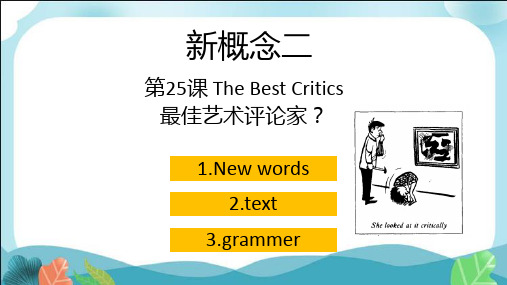
课文注释
1. They always tell you what a picture is'about’. (他们)总是告诉你一张画的“意思”是什么。 This is a book about Australia. 这是一本关于澳大利亚的书。 They are talking about modern art. 他们在谈论现代艺术。 课文中这句话可以直译为:他们总是告诉你某一幅画是“关于”什么的,也就是一幅画的“意思”是什 么。about放在引号里,一是指这些人谈论画的时候经常用到这个词,二是表示一种讽刺,因为有些 画没有任何“意思”。
★material n(c). 材料
listening materials 听力材料 n(u).织物,布料=cloth curtain mat(1)(将……)悬挂,吊: I'm hanging this picture on the wall.我正在把这幅画挂到墙上去。 Will you please hang the coat?请把衣服挂起来好吗? A pretty curtain hangs over the window.窗户上挂着一个漂亮的窗帘。 (2)垂下: John was very tired. He sat in a chair and hung (down) his head 约翰非常疲倦。他垂着头坐在椅子上。 (3)安装……使能转动/摆动: Have you hung the door?你把门装上了吗?
★ notice
(1)vt注意到,察觉到(不用于进行时): You never notice what's going on around you.你从来不注意身边发生的事。 Did you notice him leaving?他离开的时候你发现了吗? I've noticed that it is warmer here than in England.我发现这里比英国暖和。 (2)n.注意,察觉: The girl in red caught his notice.那位穿红衣服的姑娘引起了他的注意。 (3)n.(书面的)通知,布告,海报: know there's a meeting, because someone put up a notice outside the Town Hall. 我知道有个集会,因为有人在市政厅外面贴了个通知。
新概念英语第二册26课课件
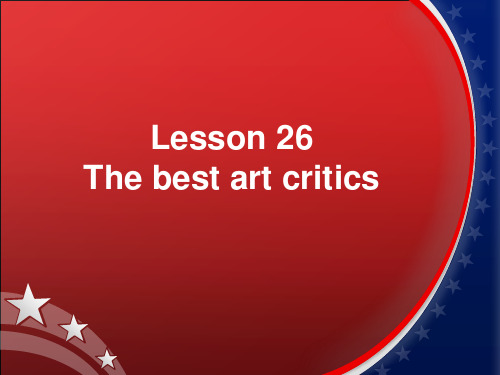
The Text
2. We like them in the same way that we like pretty curtain material.
【语言点】 pretty curtain material_漂__亮__的__窗__帘__布__ in the same way that =a_s__…__正__如__…__…_ 一样 in a way_以__某__种__方__式____
课文解析
The Text
1. Many people pretend that they understand
modern art.
【语言点】 • pretend to do sth. __假__装___…_…________ e.g. When his mother came in, the baby pretended
The Text
2. We like them in the same way that we like pretty curtain material.
【拓展】
• the same的用法 1. __同__样__的__人__;_同__样__的__事__物_____
e.g.His birthday and hers are the same. 2. 单__独__用__t_h_e__sa_m__e_,__可__指__刚__提__到__过__的__同__一__个__人__或__事物
The Text
2. We like them in the same way that we like pretty curtain material.
新概念2-Lesson26 讲义

新概念2学案第26讲 课题Lesson 26 The best art critics 教学目标 1、回顾巩固上节课所学的知识点;2、学习并掌握第26课的重要知识点:教学内容【课题导入】【单词梳理】New words and expressionsart /ɑ:t/ n. 艺术critic /ˈkr ɪt ɪk/ n. 评论家paint /pe ɪnt/ v. 画pretend /pr ɪˈtend/ v. 假装pattern /ˈpætn/ n. 图案curtain/ˈk ɜ:tn/ n. 窗帘material /m əˈt ɪəri əl/ n. 材料1. pretend v. 假装When his mother came in, the baby pretended to go to sleep.总结:______________________________________________________________________________________2. appreciate v. 鉴赏= understand and enjoyappreciate sth. 感激……我很感激你的帮助。
______________________我很喜欢做某事 _____________________enjoy v. 欣赏,得到享受,乐趣I like…I love…appreciate /əˈpri:ʃie ɪt/ v. 鉴赏 notice /ˈn əʊt ɪs/ v. 注意到 whether /ˈweðə(r)/ conj. 是否 hang /hæŋ/ v. 悬挂 critically /ˈkr ɪt ɪkli/ adv. 批评地 upside down /ˈʌpsa ɪd -daʊn/ 上下颠倒地_______We like them in the same way that we like pretty____ _____. I think that young children often _______modern pictures _____ ____anyone else. They ______more. My sister is only seven, but she always tells me _______my pictures are good______ ________. She came into my room yesterday.'What are you doing?' she asked.'I'm _______this picture on the wall,' I answered. 'It's a new one. Do you like it?' She looked at it _______for a_______. 'It's ______ ______,' she said, 'but isn't it________ ________?' I looked at it again. She was_______! It was!【等你来挑战】一、单项选择题()1.---What do you ______ do?---I want to go to the movie.A.want B.want to C.like D.to like()2.---Does the boy want to be an actor?---______.A. Yes, he is.B. No, he can’t.C. Yes, he does.D. No, he isn’t.()3.---______ kind of movies ______ Lucy like?---She likes action movies.A.What, does B.What, do C.What’s, does D.Which, do()4.In a word, we can learn a lot ______ Chinese history.A.for B.about C.with D.at()5.Gina likes action movies, ______ she doesn’t like thrillers.A.and B.so C.or D.but()6.Many people pretend that they _______modern art.A. understoodB. are understandingC. understandD. understands()7.What is it about? Tell me ______.A. what is it aboutB. what it is aboutC. what about it isD. what about is it()8.She tells me ______my pictures are good or not.A. whetherB. thatC. ifD. unless()9.Do you like my picture? It’s _______.A. a newB. one newC. new oneD. a new one()10.They notice more. They _______more.A. remarkB. observeC. sayD. take care二、翻译词组1.艺术生____________________2.当然____________________2.是否...____________________ 4.比其他任何人更好_________________________。
(精品)新概念第二册第26课件
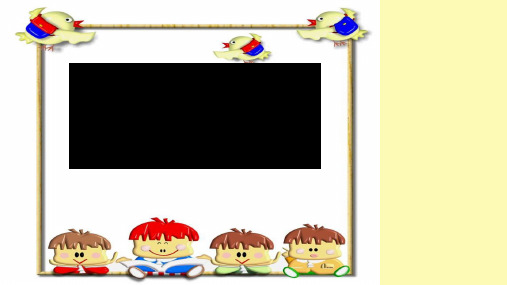
• (二)、填空
• 1 I can take Li Ming there when he _c_o_m__e_s_ ( come)
to visit. • 2 _D_o_e_s__your sister_k_n_o_w___(know)English? • 3 Her home_i_s__ a_w__a_y_ _f_r_o_m__(远离 )her school. • 4 The pot_d_o_e_s_n_’_t_li_k_e(not look) like yours very much. • 5 Where __d_o__you___h_a_v_e_(have)lunch every day? • 6 Who_w__a_n_ts___(想要 )to go swimming? • 7 _D__o_e_s_she__d_o__(do) the housework every day? • 8 Jenny and Danny usually_p_l_a_y__(play) games in
• 单引号有时代替双引号的功能,有时单引号在双 引号外,特别是英国近年来的书刊更是如此。
• In the old stories,the squirrel was a' good ' animal.
注意事项 : • 1) 引号位于一行之上, 它们应在句尾其他标
点符号—如逗号、句号、问号—之外. • 2) 引语的第一个词以大写字母开头. • 3) 在said, asked等词后面用逗号, 只有当
• a critical remark 批评性的评论
• 3 critically adv. 苛刻地,非难地
新概念英语第二册 Lesson 26课件

Translations
1. 我想知道是不是真的。 2.我不知道他是否能来。 • I wonder whether/ if it is
true. • I don't know whether/if he
can come.
用适当形式填空
1.The little boy__p_re_te_n_d_e_d(假装)to be ill so that he could stay in bed.
正如……一样
hang the picture on the wall 把画挂到墙上
look at it for a moment (看了)一会儿
upside down
上下颠倒
宾语从句
1.Many people pretend that they understand modern art.
2.She always tells me whether my pictures are good or not.
★notice v. 注意到
notice sb doing sth 注意到某人 正在做某事
他注意到她正在过马路。 He noticed her crossing the
road. n. 注意 take notice of 注意 Take notice of what I have told you
Leonardo Di Ser Piero Da Vinci
Lesson 26 The best art critics
art /ɑ:t/ n.
艺术
critic /'kritik/ n. 评论家
critically /'kritikəli/ a批dj评. 地 paint /peint/ v. 画 pretend /pri'tend/ v. 假装
新概念英语第二册 Lesson26 (共62张PPT)
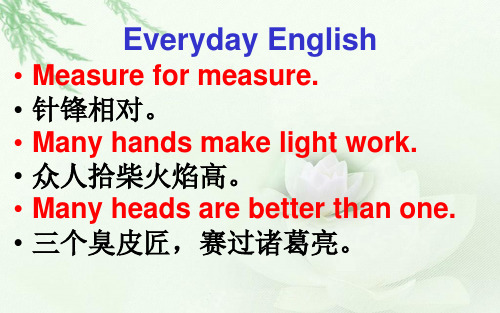
2.在介词之后用whether。 • It depends on whether he is ready.
3. 主语,表语,同位语从句中只用whether表“是否”. 2021/8/2
• (4) 引导让步状语从句时。如: • Whether he agrees or not, I shall do that. 不管他同意与否,我都要那样
Guess:
把事物弄得引人注目,描写的天花乱坠
paint it red paint sb. black as handsome\pretty
as
把某人描写成坏蛋,给某人抹黑。
paint 非常漂亮
★ curtain n. 帘,幕
• 1. behind the curtain
在幕后,秘密
• 2. call before the curtain
appreciate sb.'s doing sth
2021/8/2
• martial ['mɑːʃ(ə)l]adj. 军事的;战争的;尚武的
appreciation
“非常喜欢”这样写
have a great appreciation for ......
A lot of people outside China have a great appreciation for Chinese martial arts.武术
• pretend
Stop pretending!
1.不定式 2.名 词 3.宾语从句
不懂装懂??
他假装没有看到她。
• He pretended not to see her.
• 她假装漫不经心.
Don't pretend to know
新概念英语NCE2_Lesson26(共31页)课件

I greatly appreciate your timely(及时地) help. 我非常感谢你们的及时帮助。
★notice 1. 作名词,意为"布告,公告,启事",是可数名词 。如:
There is a notice on the office gate saying "No Parking".
▪ artist n. 艺术家
▪ artiste n. 艺人
★critic n. 批评家,评论家,鉴定家 ▪ eg. 电影/体育评论家 ▪ film / sports critic 【链接词汇】 criticise v. 批评, 批判(主要指批判, 但不完
全是责备的意思)
eg. He criticised my painting. 他批判了我的画。
(2) 布料(不可数名词) 例→ 建筑材料 building materials
蓝棉布料 blue cotton material ★appreciate v. (1)鉴赏,欣赏,赏识
(2)感激,感谢 例:Do you appreciate good wine?
你会鉴赏好酒吗?
eg. We appreciate your efforts(努力)for the
▪ appreciate v. 鉴赏 ▪ notice v. 注意到 ▪ whether conj. 是否 ▪ hang v. 悬挂,吊 ▪ critically adv. 批评地 ▪ upside down 上下颠
倒地
★art n.
(1) 美术;艺术
▪ eg. 我是个艺术生/ 学美术的学生。
新概念英语第三册第26课wanted:alargebistuittin(共60张PPT)

text
2021/8/26
• No one can avoid being influenced by advertisements.
• avoid doing sth. • v.+doing: • risk/imagine/deny/delay doing sth.
• no one, avoid, 双重否定 • No students can avoid being influenced by
• -His wonderful performance captured the audiences' attention.
• Vt.俘获,捕获,夺取
• -The police captured the two thieves.
manufacturer
• manufactory制造厂 • manufacture 制造加工 • manufactured人造的
• influence • pride • taste • exert • subtle • advertiser • classify • magic • sample
2021/8/26
• devise • capture • manufacturer • wheelbarrow • boot • ingredient • crane • anticipate
2021/8/26
wheelbarrow
• wheel 车轮;方向盘 • barrow手推车 • wheelbarrow 独轮手推车
2021/8/26
boot
• 靴子 • 行李箱 trunk
2021/8/26
• ingredient n.配料; 要素,组成部分 • 食品配料 • food ingredient • 最重要的组成部分 • the most important ingred机;鹤 • v. 伸长 • A crane cranes its neck to get a
新概念英语第2册课程讲义Lesson26
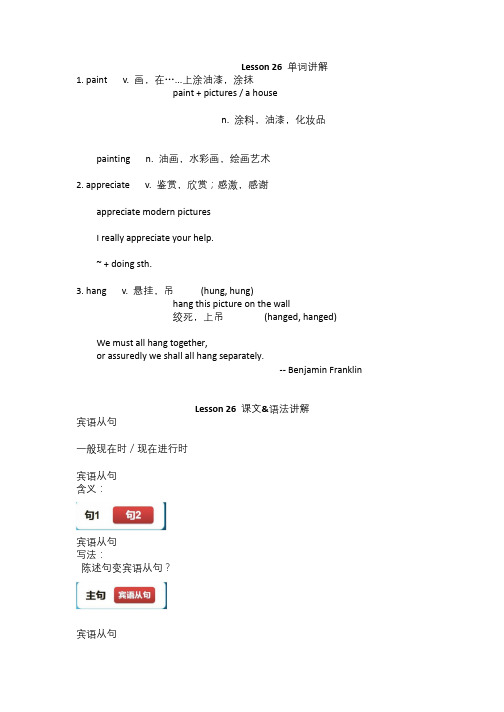
Lesson26单词讲解1.paint v.画,在…...上涂油漆,涂抹paint+pictures/a housen.涂料,油漆,化妆品painting n.油画,水彩画,绘画艺术2.appreciate v.鉴赏,欣赏;感激,感谢appreciate modern picturesI really appreciate your help.~+doing sth.3.hang v.悬挂,吊(hung,hung)hang this picture on the wall绞死,上吊(hanged,hanged) We must all hang together,or assuredly we shall all hang separately.--Benjamin FranklinLesson26课文&语法讲解宾语从句一般现在时/现在进行时宾语从句含义:宾语从句写法:陈述句变宾语从句?宾语从句写法:陈述句变宾语从句?You are right.I know(that)you are right宾语从句写法:陈述句变宾语从句?They understand modern art.Many people pretend(that)they understand modern art.宾语从句写法:特殊疑问句变宾语从句?What is a picture'about'?They always tell you what a picture is'about'宾语从句写法:一般疑问句变宾语从句?Are my pictures good or not?She always tells me whether/if my pictures are good or not宾语从句写法:1.Many people pretend that they understand modern art.2.They always tell you what a picture is'about'.3.She always tells me whether my pictures are good or not.练习宾语从句连接词+陈述句我承诺我会帮助你。
新概念英语第四册 Lesson 26 课文音标版讲义
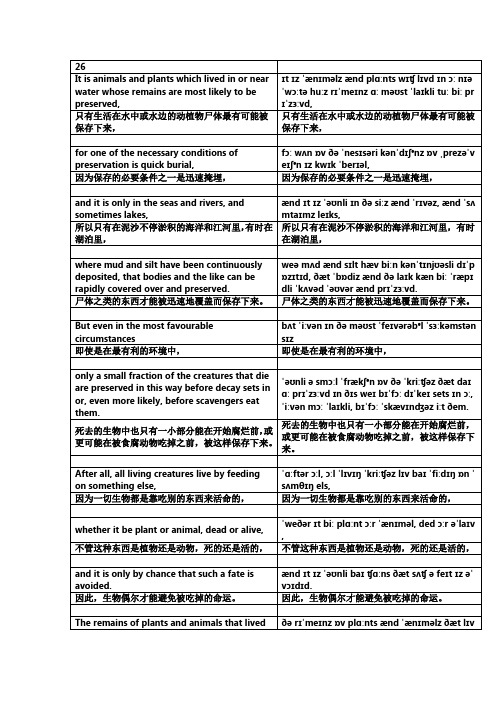
26It is animals and plants which lived in or near water whose remains are most likely to be preserved, ɪt ɪz ˈænɪməlz ænd plɑːnts wɪʧlɪvdɪnɔːnɪəˈwɔːtəhuːz rɪˈmeɪnzɑːməʊstˈlaɪkli tuːbiː pr ɪˈzɜːvd,只有生活在水中或水边的动植物尸体最有可能被保存下来,只有生活在水中或水边的动植物尸体最有可能被保存下来,for one of the necessary conditions of preservation is quick burial, fɔː wʌn ɒv ðəˈnesɪsəri kənˈdɪʃᵊnz ɒv ˌprezəˈv eɪʃᵊn ɪz kwɪk ˈberɪəl,因为保存的必要条件之一是迅速掩埋,因为保存的必要条件之一是迅速掩埋,and it is only in the seas and rivers, and sometimes lakes, ænd ɪt ɪz ˈəʊnli ɪn ðəsiːz ænd ˈrɪvəz, ænd ˈsʌmtaɪmz leɪks,所以只有在泥沙不停淤积的海洋和江河里,有时在湖泊里,所以只有在泥沙不停淤积的海洋和江河里,有时在湖泊里,where mud and silt have been continuously deposited, that bodies and the like can be rapidly covered over and preserved. weə mʌd ænd sɪlt hæv biːn kənˈtɪnjʊəsli dɪˈp ɒzɪtɪd, ðæt ˈbɒdiz ænd ðə laɪk kæn biːˈræpɪdli ˈkʌvəd ˈəʊvər ænd prɪˈzɜːvd.尸体之类的东西才能被迅速地覆盖而保存下来。
- 1、下载文档前请自行甄别文档内容的完整性,平台不提供额外的编辑、内容补充、找答案等附加服务。
- 2、"仅部分预览"的文档,不可在线预览部分如存在完整性等问题,可反馈申请退款(可完整预览的文档不适用该条件!)。
- 3、如文档侵犯您的权益,请联系客服反馈,我们会尽快为您处理(人工客服工作时间:9:00-18:30)。
Lesson26 The best art critics讲义重点一、重要单词art: n. 艺术; art student 艺术系的学生; artist艺术家;art gallery 艺术画廊critic: n. 评论家;掌握几个引申的词:criticize v. 批评,批判criticism n. 批评,批判; critical adj. 挑剔的;critically adv. 爱挑剔的;paint: v. 画;draw a picture 用线条画; paint a picture强调油画pretend: v. 假装;pretend to do sth:假装去做某事;例When his mother came in,the baby pretended to go to sleep. 当他的妈妈进来的时候,孩子假装睡觉了。
pattern:n. 图案; 模式,典范;curtain: n. 窗帘,幕布;material: n. 材料;listening material 听力材料; appreciate: v. 鉴赏; enjoy 欣赏;enjoy the music;I like poems.I love...I enjoy...得到乐趣I appreciate...程度一个比一个深appreciate sth:感激、、、;例:I appreciate your help.我很感激你的帮助notice:v. 注意到;pay attention to 思想上的注意;I notice the boy. 细节上的注意whether: conj. 是否;If 在表示是否的时候可以被whether所取代If在表示如果的时候不可以用whether取代;例:If it will rain...Whether it will rain...Whether it will rain or not...I wondered if it will rain.Whether he is mad or not.hang:v. 悬挂,吊;注意以下过去式及过去分词的区别:hang hanged hanged绞死;hang hung hung悬挂;The thief was hanged.小偷被绞死了。
The coat was hung there.外套挂在了那里。
critically:adv. 批评地;upside down 上下颠倒地;二、重要知识点1. She looked at it critically for a moment.她用挑剔的目光看了一会。
在本句中我们要掌握moment常见短语的用法:(1)at the moment:此时此刻;例He is reading a book at the moment.此刻他正在读书。
I'm afraid I'm too busy at the moment to see anyone.很遗憾,我此刻太忙,不能去见任何人。
(2)for the moment:暂时,目前;例:Stop talking for the moment, please.暂时请不要说话。
She is out, so you can use her computer for the moment.她出去了,你可以暂时使用她的电脑。
(3)for a moment:一会儿,主要接可连续性动词,例: She is out, please wait for a moment.她出去了,请等会。
I had to think for a moment before I remembered his name. 我想了一会儿才记起他的名字。
(4)in a moment:一会儿,立刻,马上,例:I'll join you in the discussion in a moment.我一会儿和你们一起讨论。
I will come back in a moment.我马上就回来。
(5)at any moment:随时。
例:The play may begin at any moment.戏剧随时就要开演。
He told me I could call him at any moment. 他告诉我随时可以给他打电话。
2. 补充知识点:look相关短语的意思(1)look at 朝......看,look at=have a look at Please look at the map of China.请看中国地图。
Please have a look at the map of China.请看中国地图。
(2)look for 寻找=search forThe old man is looking for his dog.老人在寻找他的狗。
The old man is searching for his dog.老人在寻找他的狗。
(3)look like 看起来像、、、;Nancy looks like her mother.南希看起来像她母亲。
Doesn't she look like her father?她看上去难道不像她的父亲吗?(4)look the same 看上去一样Li Ping and Li Jing look the same.李萍和李晶看上去一样。
These two pictures look the same.这两幅画看上去一样。
(5)look up 查找;抬起头等;Please look up the word in the dictionary. 请在词典中查找这个单词。
I looked up and saw him.我抬起来看见了他。
(6)look over 仔细检查;The doctor looked over Mary carefully. 医生仔细检查了玛丽。
Would you mind looking over my article? 您看一看我的文章好吗?(7)look after 照顾,照看;You must look after your old father.你必须照顾你的老父亲。
No one likes to look after the dog.没有人喜欢去照看这只小狗。
(8)look around 到处寻找、查看;We looked around, but we found nothing strange.我们四处查看,但是我们没有发现奇怪的东西。
I'm going to look around and see what I can find。
我四下逛逛,看看能发现什么。
三. 重要语法:比较级与最高级(一)形容词比较级与最高级的规则变化单音节词和少数双音节词(1)一般情况在原级词尾加-er构成比较级,加-est构成最高级。
如:high→higher→highest;tall →taller→tallest(2)以e结尾的词,直接加-r 或-st。
如:large →larger →largest; wide →wider →widest(3)重读闭音节,末尾只有一个辅音字母的词,先双写这一辅音字母再加-er或-est。
如:big→bigger →biggest; hot →hotter →hottest(4)以“辅音字母+ y”结尾的词,先变“y”为“i”,再加-er或-est。
如:happy →happier→happiest; easy→easier →easiest大部分双音节词和所有多音节词构成规则:在原级前加more构成比较级,加most构成最高级。
如:dangerous→more dangerous→the most dangerous;beautiful →more beautiful→the most beautiful;delicious→more delicious→the most delicious;quickly→more quickly→the most quickly;需要记住以下几个词比较级与最高级的不规则变化good→better →bestwell→better →bestill→worse→worstbad→worse →worstmany →more→mostmuch→more→mostold →elder/older →eldest/oldestlittle→less→leastfew→less→leastfar →farther/further →farthest/furthest(二)形容词比较级的用法1. 两者比较时用形容词比较级,其结构为“... 比较级+ than ...”如:Actions speak louder than words:事实胜于雄辩。
I am taller than him: 我比他高。
2、表示“越来越……”时,用“比较级+ and + 比较级”,多音节词和部分双音节词用“more and more + 形容词原级”。
如:We should make our country more and more beautiful.我们应该让我们的国家越来越漂亮。
The water is getting hotter and hotter.水越来越热了。
(三)形容词最高级的用法1、三者或三者以上的人或物进行比较时,用形容词最高级形式。
形容词最高级前通常需加定冠词the,句末常接in / of 短语来表示范围。
如:He is the strongest of all the boys.他是所有男孩子中最高的一个。
2. 表示“最……之一”时,用“one of + the + 最高级”。
如:The light bulb is one of the most helpful inventions.电灯泡是最有益的发明之一。
3. 表达“跟、、、一样”要用as+形容词或副词的原级+as 句型。
例:This box is as heavy as that one.这个盒子跟那个盒子一样重。
